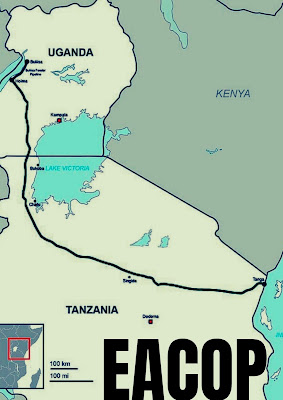The building of it is being opposed by those who care about the environment. This would put at jeopardy 12 natural reserves as well as the water supply for 40 million people.
It would be a “climate bomb” in the sense that it would put at risk 12 nature reserves and the water supply for 40 million people in East Africa. Plans for the building of the mega-oil pipeline East African crude oil pipeline (Eacop) must nonetheless be carried out in order to satisfy the requirements of the French energy conglomerate TotalEnergies and the Chinese oil corporation CNOOC. And it makes no difference that many banks and insurance firms are withdrawing their support for the program in response to pressure from activists and non-governmental organizations (NGOs) from all over the globe.
The initiative entails the commercialization of fields found in Uganda in 2006, namely in the Lake Albert area of the country. The intention is to export the crude oil once it has been transported from Uganda to the port of Tanga in Tanzania through a heated pipeline that is 1,443 kilometers in length. The governments of both nations are interested in the economic advantages of this project, and it will have the ability to carry 230,000 barrels of crude oil per day.
The plan has been heavily criticized by environmental organizations in Africa and around the world. A report published by the WWF revealed that along the pipeline’s route, it will cross 12 ecological reserves, more than 200 rivers, and thousands of agricultural farms, putting endangered species at risk. These species include chimpanzees, red monkeys, hippos, elephants, zebras, exotic birds, and mountain gorillas. In addition to this, the pipeline will go through an area that is not too distant from Lake Victoria, which is a water supply for over 40 million people. Not to mention the effect it has on the environment: 230 thousand barrels of oil produce the same amount of carbon dioxide emissions as 35 million tons of CO2 per year, which is comparable to six times Uganda’s yearly emissions. The daily LeSoir states that the temperature of the pipeline will subsequently be maintained at a constant level of fifty degrees Celsius.
Influential climate activists Vanessa Nakate and Hilda Nakabuye have thrown their support to those who are opposed to the pipeline. They have said that Africa should move away from relying on fossil fuels. In addition to causing damage to the environment, the project has the potential to become a real social bomb. This is something that has already occurred in the past in other countries on the continent. As stated in the article, “the discovery of oil in Nigeria, Angola, and the Democratic Republic of the Congo did not bring widespread prosperity.” Instead, it resulted in poverty, bloodshed, and the disappearance of traditional territories and ways of life, as Nakate describes in an editorial for the New York Times.
Oxfam International estimates that around 14,000 households will be forced off their property, and thousands of people will be relocated either financially or physically as a result. Some communities are alleged to have received compensation that is completely unsuitable for their needs. The pipeline will also disrupt the natural habitats of several animals. Bill McKibben, an author and climate activist, said that it seemed as though the route was “planned out to threaten as many species as possible.” An oil leak would be much more disastrous for ecosystems and freshwater sources.
The persistent pressure from environmental organizations, which has been organized under the hashtag #StopEACOP, has forced an increasing number of financial institutions and insurance firms to withdraw their support for the pipeline project. According to remarks made by Les Echos, “the project was extremely difficult to justify” from an environmental standpoint. [Citation needed] Following in the footsteps of Swiss Re, Zurich, Allianz Group, Axa, and Scor, the German reinsurer Hannover Re has made it clear that it does not want to participate in the initiative. Barclays, HSBC, and BNP Paribas are only three of the fifteen financial institutions who have decided against investing in the East African Crude Oil Pipeline.
After hearing all of the negative feedback, even the Italian export credit agency Sace, which is controlled by the Ministry of Economy and Finance, would have reached the conclusion that it was best to scrap the contentious project. The choice to participate in the project had infuriated activists working for Friday for the Future, who had sent an onslaught of e-mails to the corporation in an effort to dissuade it from providing insurance for Eacop.
Despite the fact that the building of this pipeline is many years behind schedule (construction was supposed to begin in 2016), Uganda, Tanzania, TotalEnergies, and Cnooc do not seem inclined to abandon the project; the final decision was signed in February of this year. investment (Fid) made by both parties in the deal. To win over investors and detractors, it took Total more than six years, as well as a cooperation with a Chinese oil firm and the sale of another 10 percent of the project’s shares to businesses in Uganda and Tanzania.
The leaders of the French organization do not seem to be concerned by the defections that have been registered so far. Marsh McLennan, an insurance broker with headquarters in New York, would reportedly participate in the initiative with a bank from South Africa and a bank from Japan, as reported by both the Financial Times and the Bureau of Investigative Journalism.









+ There are no comments
Add yours